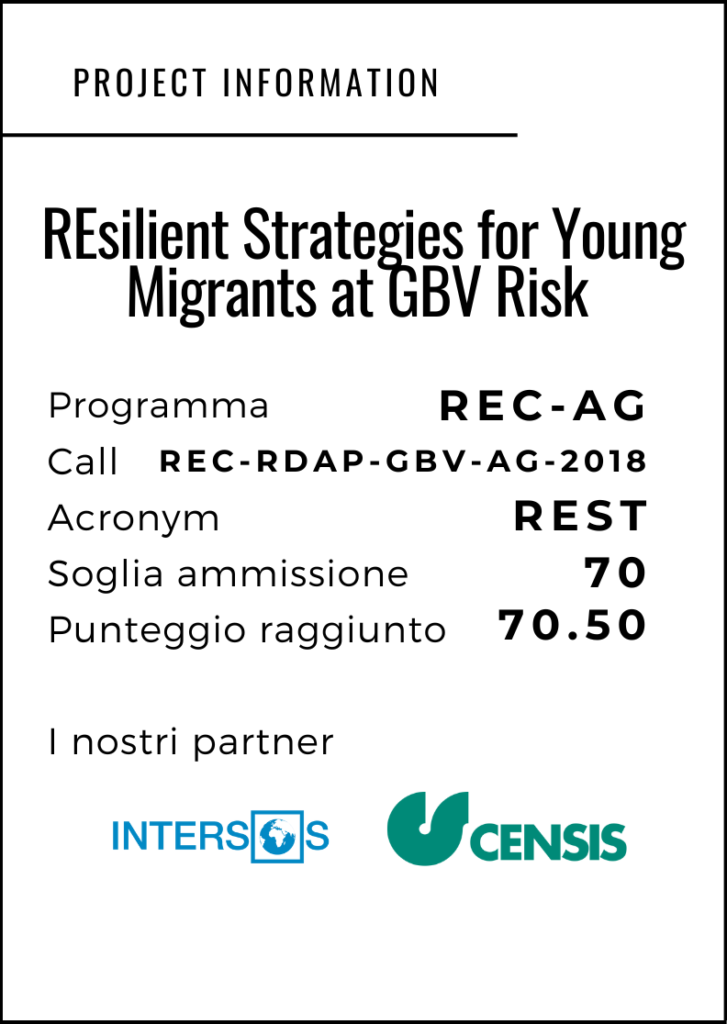e attività di progettazione europea rappresentano un'opportunità importante per noi, in quanto ci permettono di collaborare con partner internazionali e di realizzare progetti innovativi che hanno un impatto significativo sulle comunità locali e globali. Grazie ai finanziamenti europei, siamo in grado di sviluppare progetti di ricerca, innovazione e sviluppo sostenibile. Lavoriamo a stretto contatto con un network di partner europei provenienti da diverse aree e settori, unendo le nostre competenze per affrontare le sfide e raggiungere obiettivi comuni.
In questa sezione, potrai esplorare una panoramica dei progetti europei a cui abbiamo partecipato.
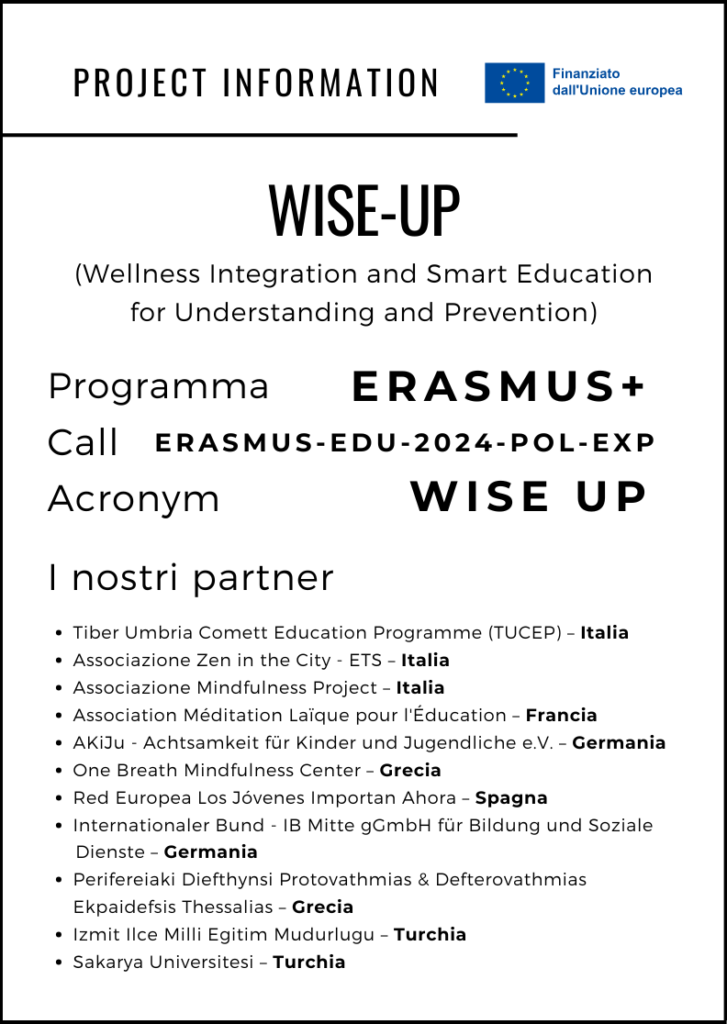
The WISE-UP project will be starting soon! Stay tuned for updates in our News section and follow us on LinkedIn for the latest developments.
Il progetto WISE-UP inizierà presto! Per aggiornamenti seguici su LinkedIn e le nostre News.
Abstract - WISE-UP (Wellness Integration and Smart Education for Understanding and Prevention)
The WISE-UP project addresses the contemporary challenges faced by young Europeans in the digital age, with a unique emphasis on the preventive health benefits of mindfulness. The initiative aims to equip students and teachers with tools to manage digital stress, integrating mindfulness into educational curricula. The ultimate goal is to foster a culture of emotional balance to effectively promote digital well-being in educational institutions. Students will be encouraged to become active participants in building their digital well-being, understanding the causes of digital stress, and developing mindful solutions through a non-violent approach. Through interactive workshops, the project will create a participatory environment where students can improve their digital habits using mindfulness techniques. The project will engage students in self-reflection on digital usage and its impact on well-being through a specialized questionnaire, emphasizing mindfulness as a key tool. At the same time, a dedicated methodology will be developed to help teachers introduce mindfulness in the classroom, fostering the integration of social and emotional skills within school curricula. A user-friendly app with educational materials on mindfulness will be created and made available in eight languages to support teachers across Europe. The project also highlights the role of mindfulness in preventing future health issues, supporting young people in developing non-confrontational, respectful communication. To ensure a lasting impact, the methodology, materials, and key outcomes will be widely disseminated and integrated into educational institutions. This will help influence school policies through awareness campaigns and targeted efforts to promote the adoption of mindfulness-based practices in education. Ultimately, the project aspires to shape a generation that is both digitally aware and competent, capable of thriving responsibly in an ever-evolving digital environment.
Abstract - PAtients and DOctors Alliance - PADOA
The core objective of the present project is that of improving health literacy across Europe, ensuring that citizens, patients, caregivers and healthcare professionals have access to accurate, timely, and easy-tounderstand information on cancer prevention, diagnosis, treatment and life after cancer. The project will improve access to the information packages to disadvantaged groups such as people with low literacy skills, low income, people from different nationalities like migrants, refugees and Roma, including the inhabitants of rural and internal EU areas. The project has a focus on cancer patients by using a participatory approach by involving and engaging them together with the medical staff to offer orientation and information and involve them as facilitators for the dissemination to the larger public. This bottom-up approach will be used to fill the communication gaps between doctors and patients, who will thus educate each other. It will have the double aim of improving the circulation of information regarding prevention and correct lifestyles to the average citizen who never dealt with cancer before, and as a second goal, it will help former cancer patients to support their return to life after the illness, offering orientation on available services and promoting forms of peer to peer communication and engagement with other individuals in the same situation. The patients involved in the 3 countries as facilitators, will help to design and participate in the information activities and in the management of the social and internet pages supported by the medical équipe and coordinated by a shared management including both doctors and patients. Added value to the project is the link established between health and social and employment services in order to promote an integrated intervention for cancer patients, often affected by a number of issues like underemployment or unemployment which add on to the ongoing, already challenging illness.
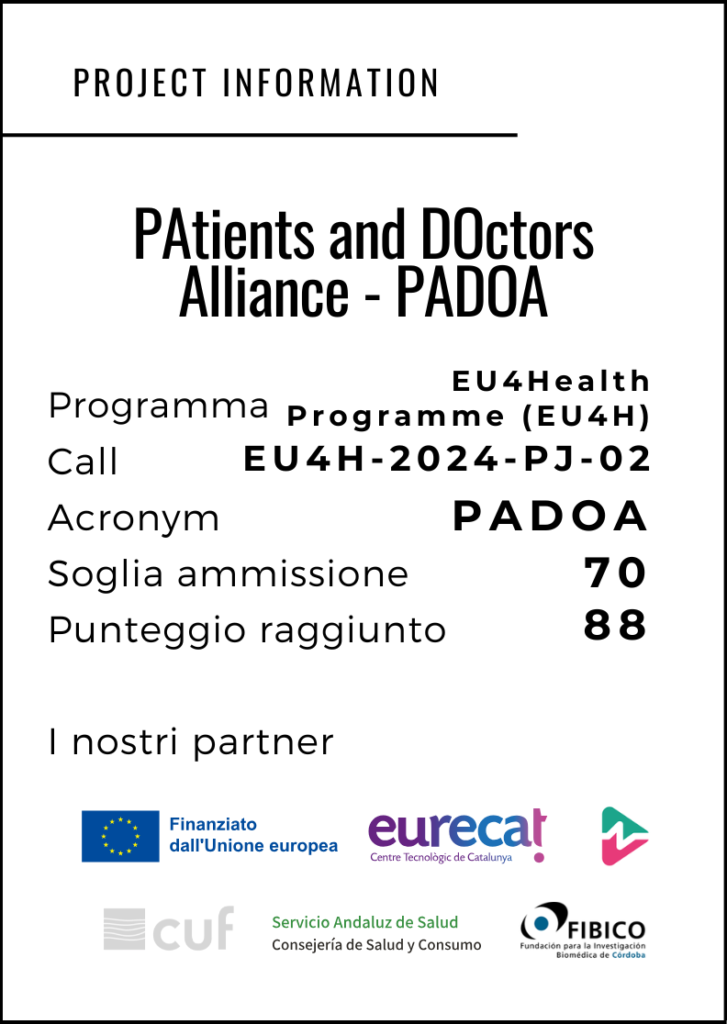
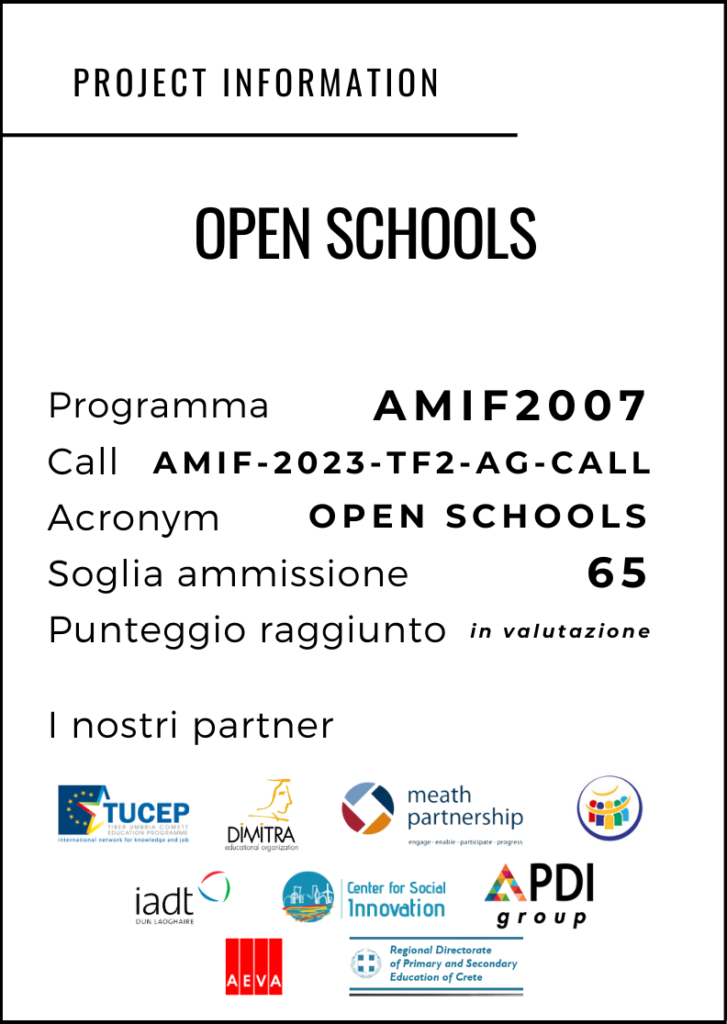
Abstract - OPEN SCHOOLS
According to the European Demographic Bulletin prepared by Eurostat, during the period from 2010 to 2019, immigration of both foreign citizens (inside and outside the EU) and national citizens returning to their country of origin has increased in all States members, except in Italy. The arrival of foreigners has led to a significant increase in ethnic and cultural diversity in the EU, which today has a mosaic of people of different origins, which represents an unprecedented social change. Regarding the European Law, the Treaty of the European Union and the Charter of Fundamental Rights of the European Union in articles 21, 22 and 35, which are directly related to migration and health, highlight the fundamental rights by those of us who fight by achieving the objectives of the project: non-discrimination, cultural diversity and equal access to health resources. In addition, the Treaty of the European Union, in the general provisions, states "The Union will combat social exclusion and discrimination and promote justice and social protection...”. According to this background, the general objective of OPEN SCHOOLS project is to design and develop specific training/education programme for immigrant parents and children, focusing on the acquisition of key competences and soft skills for social inclusion and well-being through the methodology of Collaborative Comics Storytelling. Specifically, the programme will be aimed at the acquisition of soft skills and language competences but also cultural/ICT/social and civic competences through the exploitation of the emotional dimension of training. These competences will also provide migrants parents and children opportunities for public voice (providing information on access to social services, on access to communication and rights and responsibilities), which are fundamental for a real social inclusion in the host community.
Abstract - Digital One Health and Veterinary Entrepreneurship
DOHVE project aims to address skill gaps in the veterinary sector in the EU through a comprehensive needs assessment, the development of an updated curriculum, delivery of training programs, microcredentialing through a blockchain-based platform, and evaluation of the training's impact. The project will focus on European scenario and involve collaboration between academic and industry partners to ensure the curriculum meets the needs of both sectors. DOHVE aims to address the needs in the veterinary sector by providing international mobility opportunities, developing a training program on digital technologies and microcredentialing, fostering entrepreneurship, and enhancing collaboration and partnerships. The project will offer internships and job shadowing opportunities, provide training on topics such as blockchain technology and telemedicine, organize workshops on entrepreneurship, and create a network of veterinary schools and research. DOHVE contribute to the growth of higher education in veterinary areas developing a training program on digital technologies and microcredentialing, fostering entrepreneurship, and enhancing collaboration and partnerships. The project will offer also experiences of internships and job shadowing opportunities, provide training on topics such as blockchain technology and telemedicine, organize workshops on entrepreneurship, and create a network of veterinary schools and research organisations.
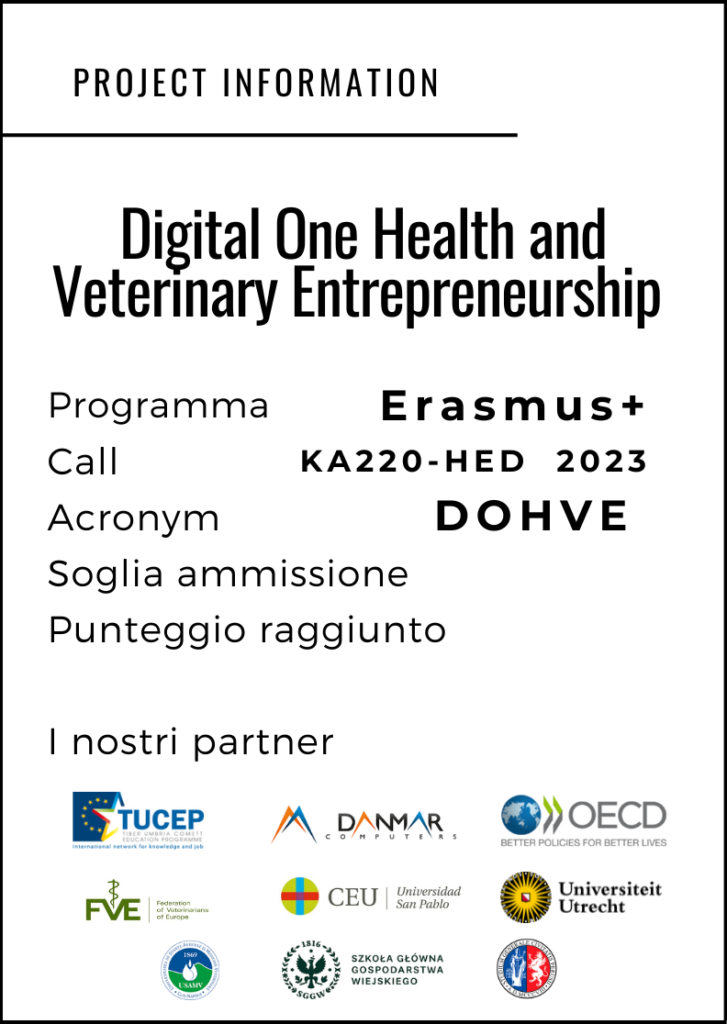
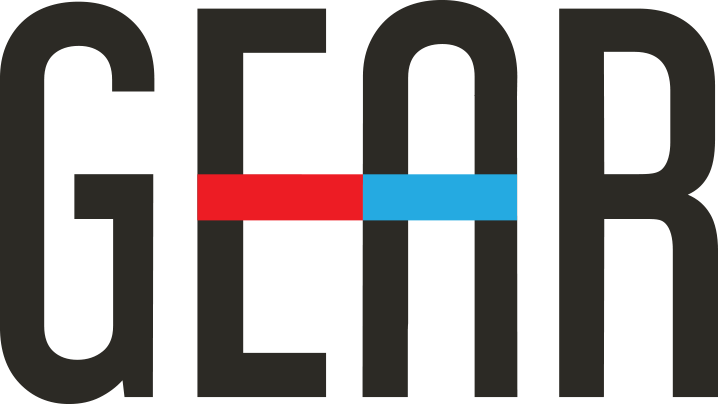
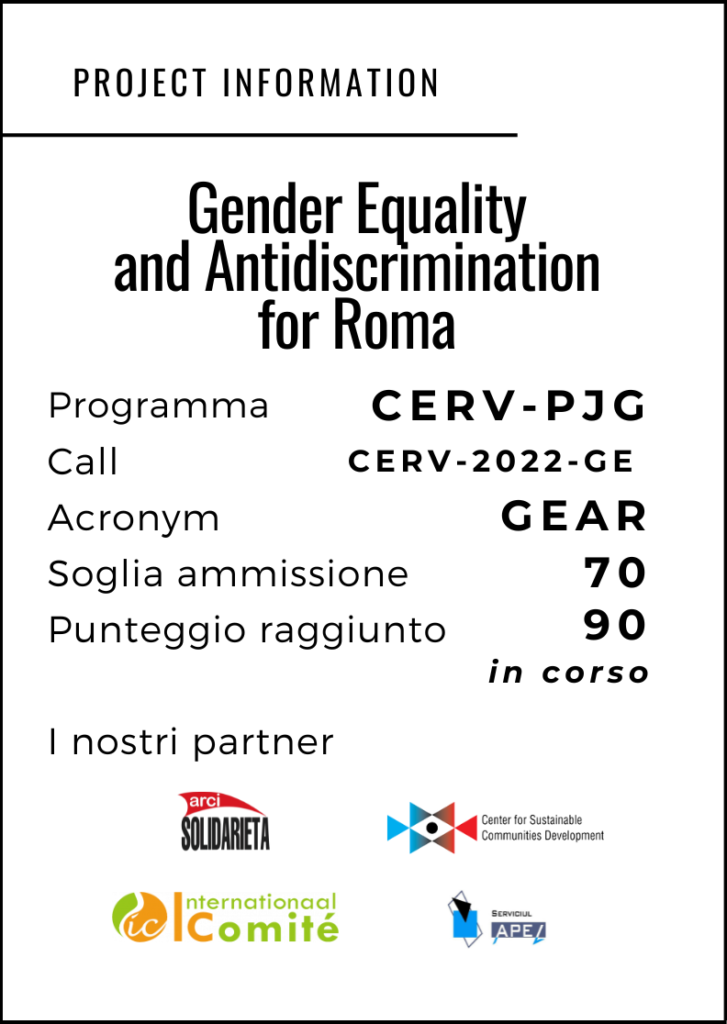
Abstract - Gender Equality and Antidiscrimination for Roma
GEAR, Gender equality and antidiscrimination for Roma, aims at promoting gender equality and tackling gender stereotypes through the involvement of young Roma as agents of change in Italy, Bulgaria, Romania and Belgium. The project intends to establish new alliances among young Roma - boys and girls - empowering and encouraging them in a shared path of engagement to promote gender equality by: supporting the development of non-stereotypical relationships; training young Roma as agents of change in the field of gender equality and prevention of gender stereotypes through street education activities, training sessions, management of a web-radio, peer to peer activities; adopting a prevention approach working with young people and providing them the tool to support emancipation and awareness on gender relations; training practitioners from public and private sector on gender equality issues and on how to translate these principles into administrative and institutional actions.
Abstract - REACH-OUT: integrated community healthcare and OUT-REACH services for hard-to-reach populations
he project REACH-OUT will design and implement an integrated intervention dedicated to improve global health outcomes for migrants and disadvantaged local population groups through prevention, early detection and access to care for TB, HIV, STIs, hepatitis B and C in Italy, Malta and Greece, and to reinforce and promote stakeholders cooperation. In order to reach the objective above, this project will undertake a number of actions dedicated to raise awareness and promote prevention of HIV/AIDS and TB spreading the information to the larger possible audiences (general public, migrants, professionals, institutions and organisations working in this sector), in order to maximise the project impact. The project will adopt a holistic approach to providing services for migrants through the use of internet technology via the development of a targeted communication campaign through the main social media used by the migrant population aimed at sharing information about existing services and STIs/HIV prevention. The main changes expected from the project activities are the following: Behavioural changes among target groups in regard to health and in particular to HIV/STIs and TB. Favouring access to biomedical intervention to prevent HIV Improved access to public health services Practical improvements for Health Authorities in their capacity to reach all residents on a given territory, including those present illegally or settled in informal dwellings.

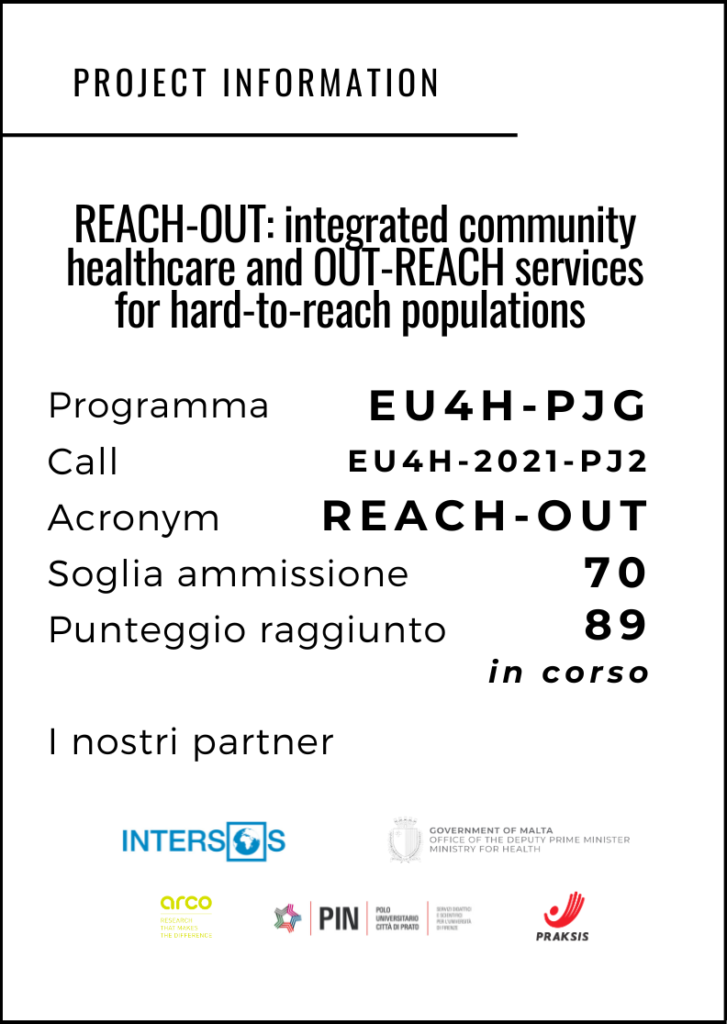

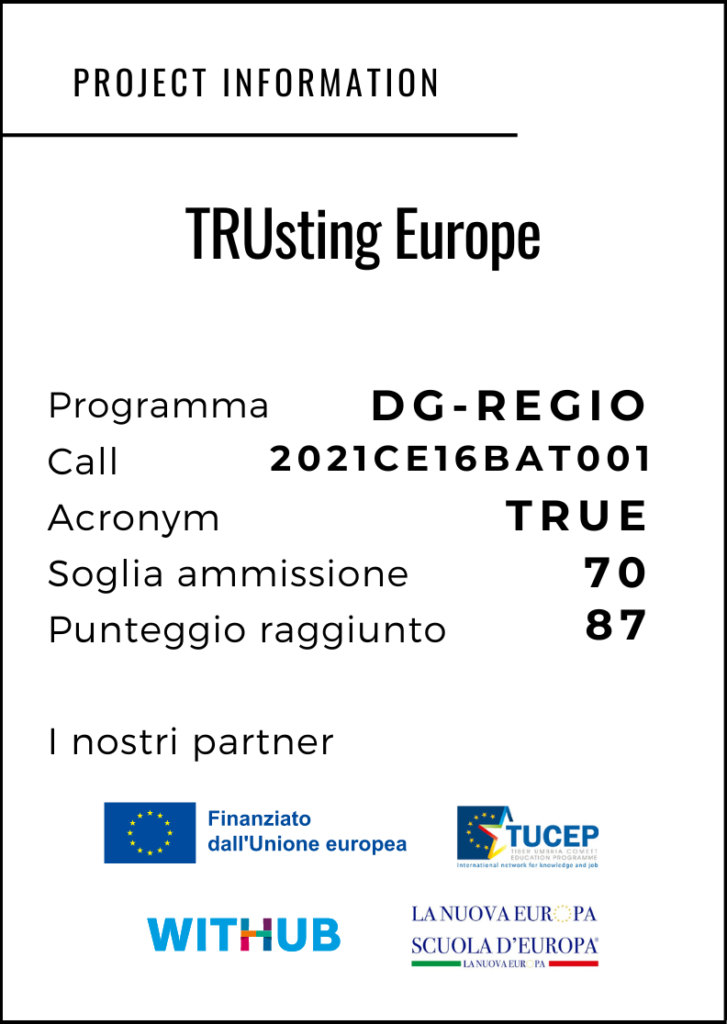
Abstract - TRUsting Europe
The objective of the TRUE project is that of raise awareness and foster and promote informed knowledge on the actions and policies designed and implemented thanks to the mechanism of the Cohesion Policy. The scope is that of diffuse correct and widespread information highlighting the impact that these concrete measures have effectively had on citizens, institutions and the territories; increasing the visibility and positive impact that Cohesion Policies and Tools have on the every day’s life of European Citizens with particular attention to concrete support such as those offered in the field of sustainable economic growth and boosting occupation. EU institutions and policies have been for long perceived as distant and generally viewed as an obscure, hyper specialistic far away theme regarding political and economic agreements decided in Brussels, and of direct interest only to the expert’s view. This underlying attitude of disinterest and ignorance has accompanied for many years everything that had the label “EU”. Reasons for this are various, and they go from National political disinterest, which failed to sparkle the interest of citizens on the theme, to the recent phenomenon of social media misrepresentations and fake news diffusion, to the objective difficulty for MA, which are administrative bodies, to undertake a professional communication campaign targeted at the various population strata and able to both communicate and engage. The capacity to promote civic engagement and active involvement has represented another weak point in the relationship between this abstract body called “EU” and the living, flesh and bone citizens, It is known that EU fundings are much needed tools, used for investments and programs, that the resources available are consistent, and that they finance a wide range of interventions, structural, infrastructural, social and economic. However, at the same time, persists the lack of a clear understanding of how, through which mechanism, and with what political/decisional weight, can citizens engage and actively and effectively participate to the decision making process.
Abstract - Gender Equality and Antidiscrimination for Roma
Gender Equality and Antidiscrimination for Roma’s objectives are: (a) empowering Roma youth, both girls and boys, by fostering cognitive and technical tools to support their emancipation and awareness on gender relations; (b) fostering women emancipation and help children and young adults to develop awareness about prevention of gender-based violence; (c) supporting the engagement of men and boys as allies; (d) increasing social workers capacity to the target groups’ needs; (e) creating and testing an intervention model to be readapted in similar contexts. The project will: 1. Realise outreach activities in Roma communities through an educational mobile unit and ethnographic fieldwork. 2. Train young Roma as actors of change in the field of gender equality and the prevention of gender-based violence with training sessions, management of a youth web- radio, peer-to-peer activities. 3. Train social workers on gender equality issues and on how to translate these principles into action. 4. Implement a communication and dissemination campaign to promote a counter-narrative on Roma youth involvement to prevent gender-based violence. 5. Model the intervention through 1 Handbook for social workers; 1 Toolkit in digital format on youth involvement; 1 Web Radio Handbook. The targets will be: 621 (288 boys and 333 girls) Roma youngsters of both genders from Rome encampments (11-20 years old); 100 social workers of NGOs working in the field of disadvantaged local, migrant and Roma youngsters. For young Roma training activities will result in increased employability, improved awareness on gender equality, ability to correctly communicate through social media and web-radio. Social workers will increase awareness regarding Roma beneficiaries, inclusion of a gender perspective and gender equality contents and practices. They will be able to design and implement projects, programs and services that include a gender-equality dimension particularly for disadvantaged beneficiaries.
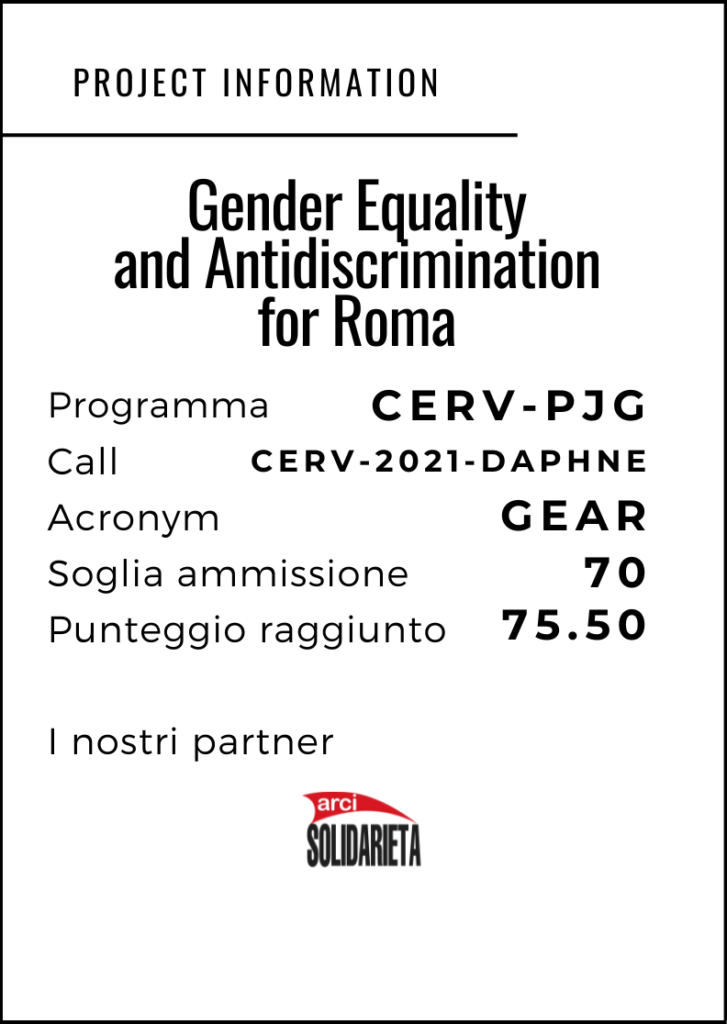
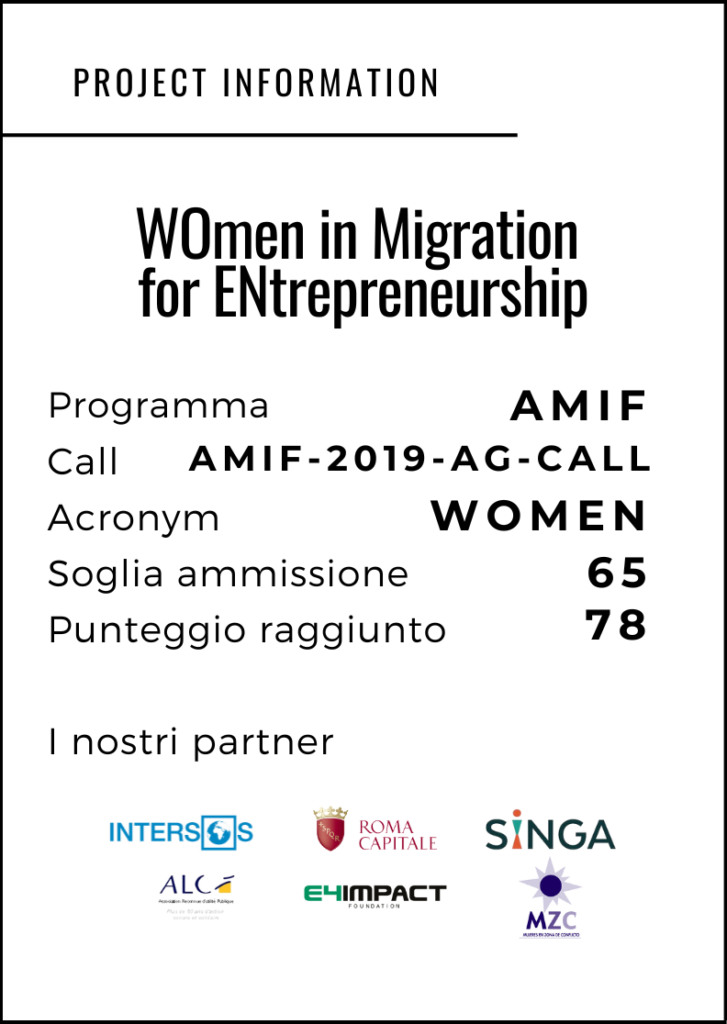
Abstract - WOMEN: WOmen in Migration for ENtrepreneurship
Effective inclusion projects for vulnerable targets such as migrants, should deliver practical tools and actions to reach this goal in an effective and timely manner. This is the aim of this project, which is dedicated to the economic inclusion of migrant women in three EU countries: Italy, France and Spain. The partnership is composed by NGOs, Academy and Local Authorities, in order to represent and involve all relevant actors. Such general objective will be reached through the following actions - Delivery of specific training modules to enable women to access the world of entrepreneurship. The training is focused on strengthening the capacities of individuals, reinforcing their entrepreneurial, management, fundraising, networking and communication skills - Active support to trainees toward the creation of their own business enterprise according to criteria of sustainability, economic and financial viability - Production and dissemination of an “inclusion package” which could easily be transferred to other EU countries (this include the training model and the training and communication toolkit, strategy to address key decision makers etc) - Dissemination of a cost-effective, self-employment model developed by the City of Rome - Dissemination of results, methodology and deliverables at local, national and EU level under form of policy advice reports Direct beneficiaries will be Migrant women involved in the training Professionals responsible for migrants’ integration Indirect beneficiaries will be Migrant women’s network and associates Professionals responsible for migrants’ integration Local markets The short-term effects of this project will be: 75 women receiving high level training; diffusion among those working within the migratory ambit of a method and a toolkit for economic inclusion; The long-term impact of these actions will be the economic viability and sustainability of the model and economic enterprises proposed and the its “imitation effect".
Abstract - Reach out Inform Support Empower against GBV
This project aims at: -facilitating the access to services and information regarding anti-violence and psychosocial and medical care for the hard-to-reach population in Sicily, and especially the foreign population that dwells in informal settlements; -strengthening the existing response system to GBV and foster the capacity of the main stakeholders to effectively detect it and to respond in a multi-sectoral fashion, effectively deploying the services. Specific Objectives: - “Reach the unreachable”: offering to (potential) survivors: immediate health and psychosocial support, information, service orientation and referrals. - Strengthen both horizontal and vertical governance by improving the coordination and communication between the network. Improving the accessibility and usability of services dedicated to GBV (potential) survivors, thus improving prevention. - Strengthen the capacity of health and social workers to identify, understand and support GBV (potential) survivors, and to use the network to address them to the key services. - Create a multisectoral safe space for women where they can receive information, support and orientation, as well as psychosocial case management, and where they can participate to socio-educational activities. Activities: - Outreach activities in informal settlements - Set up of a safe space for women and girls - ToT for community health promoters - Training for professionals - Regional coordination meetings - Online communication Beneficiaries: - (Young) migrant women (potential) GBV survivors - Focal points from migrant communities - Officers from institutions and third sector Results: - Increased N. of migrant women reached out and informed about existing services - Increased N. of GBV survivors accessing dedicated services - Opening of a safe space - Community Health Promoters trained on health and protection issues - Strengthened integrated response - Increased professionals' capacity to detect and support GBV survivors
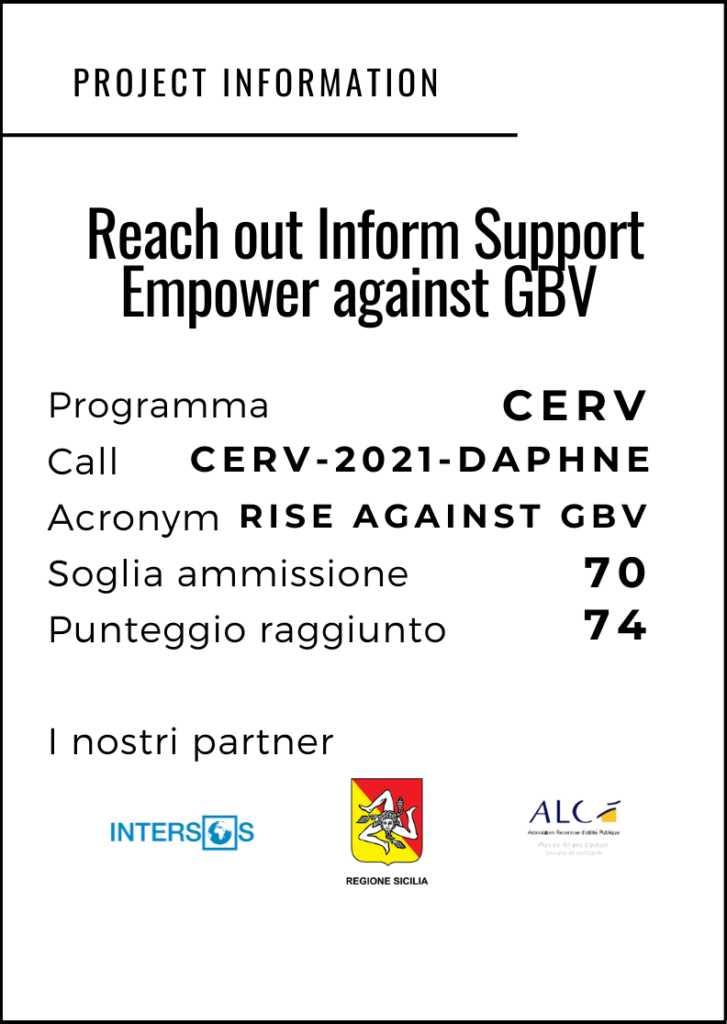
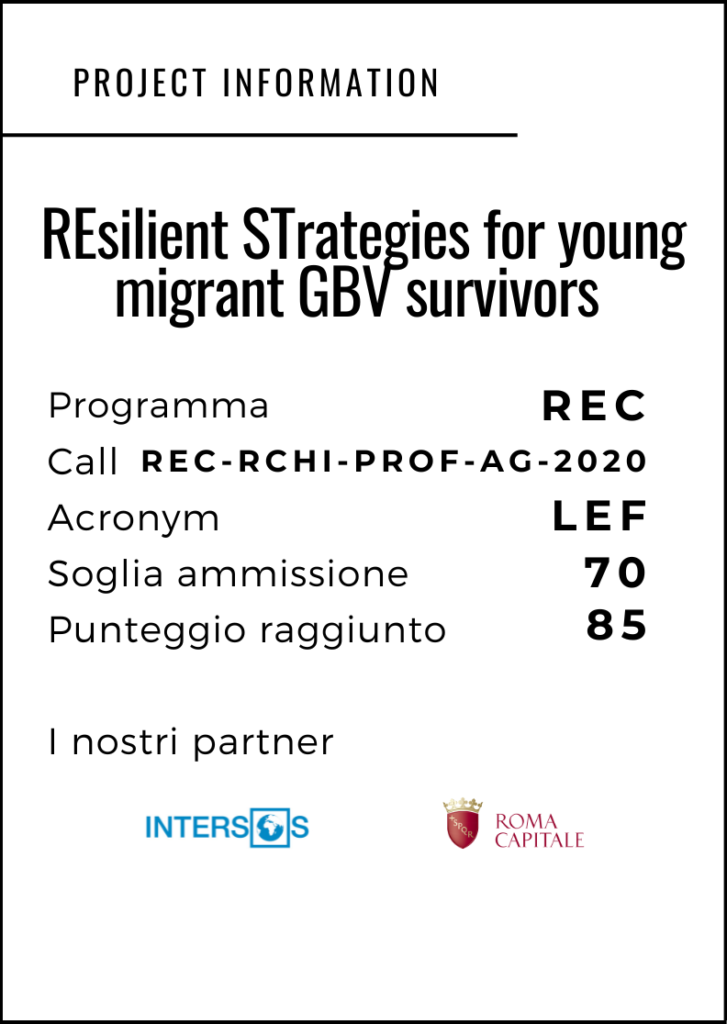
Abstract - REsilient STrategies for young migrant GBV survivors
The general project's aim is to implement a strategy to reach out to migrant unaccompanied minors(UAMs) and young men who are victims of sexual violence and/or exploitation or are exposed to it, providing them with tailored support. This goal will be achieved by setting up standard operative procedures (SOPs) for professionals which will be initially tested in Rome, where high flows of young migrants continue to converge, to ensure the most efficient care and support model possible and by fine tuning existing services. Specific Objectives 1. Develop SOPs to increase the capacity of institutions and NGOs to deal with UAMs and young men survivors of sexual violence and/or exploitation, improving synergies among all the actors involved. 2. Reach out to migrant UAMs and young adults with specific tools to build a tailored reception model able to accompany them toward a safe environment. 3. Sensitize migrant youngster through a targeted social network campaign to inform about the risks of sexual violence and/or exploitation in Europe 4. To increase building capacity of local institutions and NGOs’ operators Activities - Design and implementation of a strategy to reach out to UAMs and young adult victims of sexual and gender-based violence (SGBV) or exposed to it - SOPs design and testing phase - Training for professionals - Field activities: Implementation, monitoring and evaluation - Communication, and results dissemination Direct beneficiaries: UAMs and young adults survivors of sexual violence and/or exploitation or exposed to it (500) Officers from Institutions and NGOs (100) Indirect beneficiaries: Institutions and NGOs’ professionals in the field Expected results On UAMs/young adults Increase the N. of UAMs reached out by services Increase the N. of UAMs accessing support services Improved awareness raising and orientation On operators Strengthen integrated response through shared SOPs Improve building capacity Fine tune the integrated response offered
Abstract - REsilient Strategies for Young Migrants at GBV Risk
The general aim of the project is to implement a strategy for the reaching out of migrant unaccompanied minors victims of GBV and to target young male victims of violence and at risk of prostitution, with specific and personalized support. This objective will be reached through an operative protocol for professionals which will be initially tested and experimented in Rome, where significant flows of young migrants continue to converge) in order to guarantee the best and most efficient care and welcoming model and by adapting the already existing services to this theme. Objectives: 1. To generate an operative protocol to assist professionals working with unaccompanied migrant minors victims of sexual and GB violence developing better synergies among all the actors involved 2. To intercept unaccompanied migrant minors and young adults with specific tools in order to build a tailored welcoming model able to accompany the minor toward a safe environment 3. To sensitize migrant youngster through a social network campaign and in particular young boys to prevent and inform about the risks of abuse, GBV and sexual exploitation in Europe
